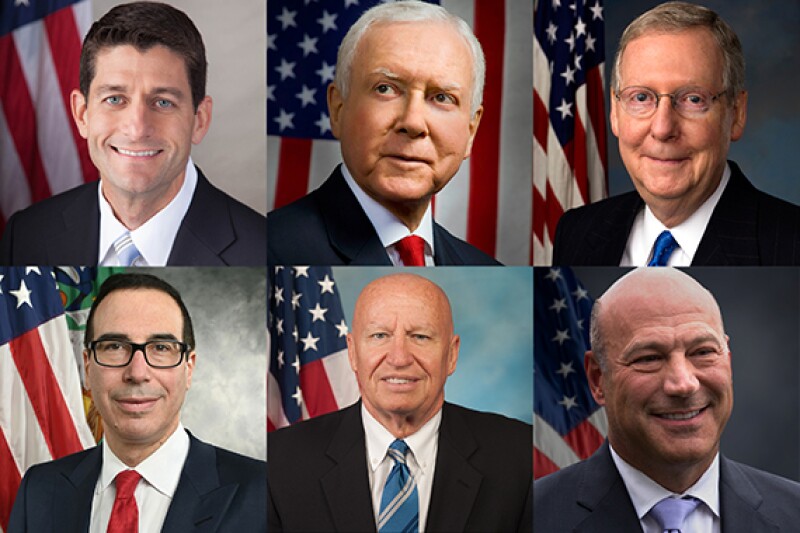
|
US Tax Reform Big 6 is a new entry this year |
The proposals to overhaul the US tax system are advancing quickly and will be a triumph for President Donald Trump and his administration if they are passed by Congress by December 31 2017 as planned. The significance of the work undertaken by his sextet of policymakers, and the long-term impact of their plans, means International Tax Review has awarded them the top spot in this year's Global Tax 50.
The Big Six is composed of Secretary of the Treasury Steven Mnuchin, National Economic Council Director Gary Cohn, Senate Majority Leader Mitch McConnell, Senate Finance Committee Chair Orrin Hatch, Speaker of the House of Representatives Paul Ryan, and House Ways and Means Committee Chair Kevin Brady.
Trump had made US tax reform an integral part of his presidency election campaign and its success is crucial to his credibility and the reputation of the Republican Party – particularly after the Republicans were defeated on the healthcare bill.
The Big Six unveiled the proposed Tax Cuts and Jobs Act for the largest overhaul of the US tax code on September 27. The swift approval of the proposals by the House of the Representatives came only two weeks after it was unveiled.
With 277 Republican votes, the Big Six's 400-plus-page legislation is seen as the greatest opportunity to achieve a key objective of the US government. "This vote is a big step forward – but it is not the last step. We will continue to strengthen this legislation and, working with the Senate, we will put tax reform on the President's desk by the end of the year for the first time in 31 years," Brady said after the bill was passed in the House on November 16.
At the time of writing, the House had agreed on its version of the tax reform bill and the Senate Budget Committee had passed it too, turning attentions to the Senate floor where a win for the Republicans will be a tough challenge*. The two versions of the tax bill laid out by the House and Senate will eventually be merged into one piece of legislation for enactment. However, achieving an agreement between the House and Senate by the end of 2017 is a tall order – and ITR expects Congress to still be debating the finer details into next year.
The bill is said to deliver a 21st century tax code that will provide tax relief for businesses, end incentives to move jobs, capital and tax revenue overseas, and broaden the tax base by removing tax breaks and closing loopholes.
For businesses, the main deliverables of the draft Tax Cut and Jobs Act include moving to a territorial tax system, reducing the corporate tax rate to a flat 20% rate (25% for personal services corporations), introducing deductibility limits of net interest expenses to 30% of a business's adjusted taxable income, amending the taxation of foreign income, and introducing an excise tax on certain payments from domestic corporations to related foreign corporations.
The proposed move to a territorial tax system would realign the US with the rest of the world and be of great influence in the international tax arena. By adopting a territorial system, which would allow US companies to not pay US tax on dividends earned from foreign subsidiaries, the US could keep its own rate for profit generated in the country at any level without affecting the taxation of foreign profit. It would also discourage corporate inversions. Also, the anti-BEPS measures are largely aligned with the work of the OECD on interest deductibility in the BEPS package on Action 4 – another progressive step forward by the Big Six.
Whether these remain in the final legislation will be determined by its support from lawmakers, however.
Notably, the House of Representatives has agreed on the implementation of a 20% corporate tax rate in 2018, but the Senate wants to impose the reduced rate by 2019. The debate surrounding these discrepancies could be what holds up progress.
For such a historic reform package, the process of unpicking the Big Six's legislation to reach a final agreement and enact the much anticipated tax reform plan will have a lasting influence on the tax world. Everyone's eyes are now on the US, waiting to see if it can deliver its promise for change – or if it will fail.
*Facts correct as of November 11 2017.
The Global Tax 50 2017 |
|
|---|---|
The top 10 • Ranked in order of influence |
|
6. Arun Jaitley |
|
The remaining 40 • In alphabetic order |
|
| The Estonian presidency of the Council of the European Union |
|
| International Consortium of Investigative Journalists (ICIJ) |
|
| United Nations Committee of Experts on International Cooperation in Tax Matters |
|









